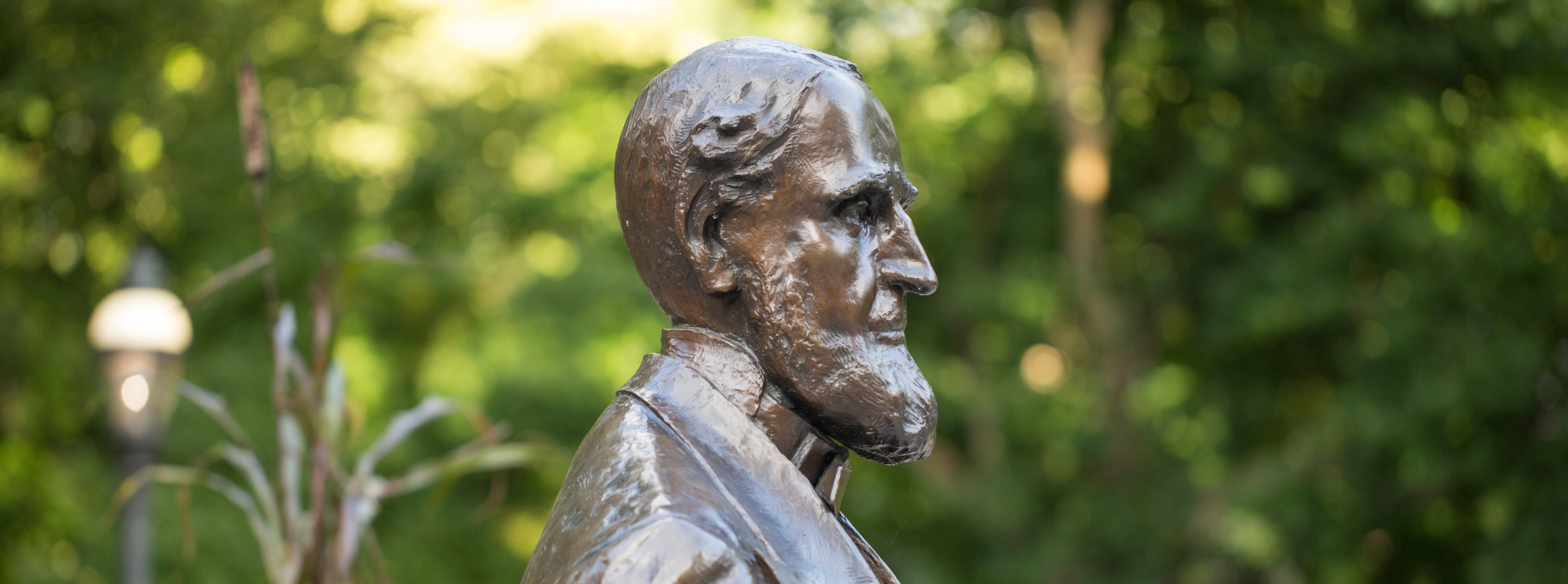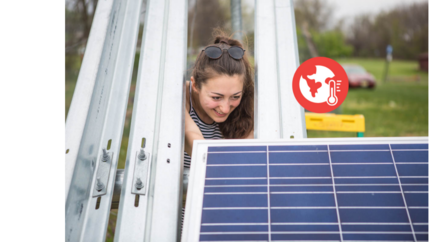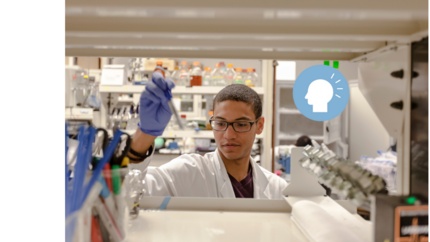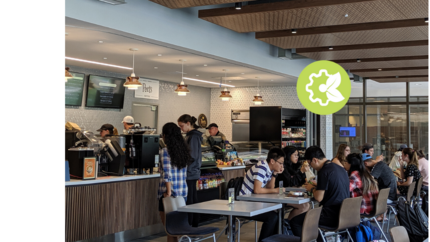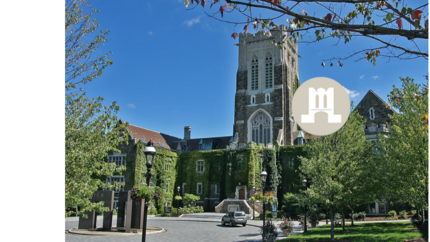The plan builds on a legacy of integrating financially prudent, just, and verdant practices into our administrative, academic, and operational processes.
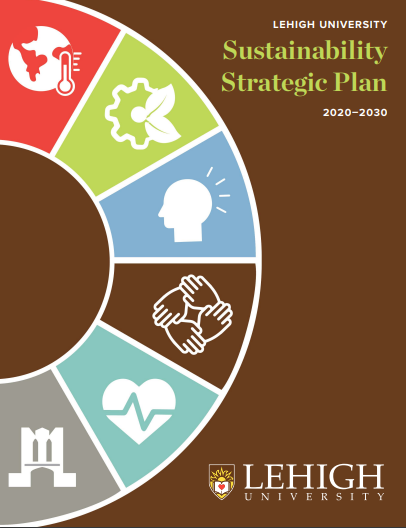 Sustainability Strategic Plan 2030
Sustainability Strategic Plan 2030
The Sustainability Strategic Plan 2030 is an interdisciplinary and interdepartmental effort that builds on the university's 2009 Climate Commitment, 2012 Campus Sustainability Plan, and the Campus Sustainability Plan 2020.
Stakeholder engagement was a crucial part of the strategic planning process in order to establish shared goals and policies for sustainable change across Lehigh’s three campuses. The university’s five colleges and administrative departments across campus collaborated with the Office of Sustainability to develop the goals in this plan and are fully committed to lead the progress toward those goals.
Throughout the one-year strategic planning process, the Office of Sustainability and the Lehigh Sustainability Council engaged the Lehigh campus community—faculty, staff, students, and alumni—as well as the broader Bethlehem community.
Click on the image to the left to view a PDF of the plan or scroll down to view the plan in HTML format.
2030 Plan Sections
The consequences of climate change have sometimes been viewed as issues that future generations would need to face. But as we endure a record-setting hurricane season and the worst wildfire outbreak our country has ever witnessed, it has become more clear than ever before that swift, real action is needed immediately.
As an institution of higher education, Lehigh has a common purpose and shared commitment in addressing global issues. We remain committed to the notion that we have an obligation to change the world for the better. Our decisions and practices affect our surrounding community, and the wider world, and we will continue to build on the progress we have made toward a more sustainable future while spurring innovation and encouraging new ideas for a better, healthier and more equitable tomorrow.
As our world faces the current environmental crises, it has also been changed by the COVID-19 pandemic. As a result, universities the world over are being confronted with challenges the likes of which we have never seen before. We are being forced to rethink the ways we teach, the ways we conduct research and the ways that we serve our community.
But even amidst these obstacles, we remain committed to our core principles. Sustainability is a strategic initiative at Lehigh. We recognize that we must continue to enhance our efforts in sustainability in order to battle these increasingly critical global challenges.
Sustainability efforts at Lehigh have long been both intentional and inventive. The goals outlined in the Sustainability Strategic Plan 2030 are a collaborative effort, created in consultation with the Office of Sustainability, the university’s five colleges, departments across campus, as well as students, alumni, faculty, staff and the broader Bethlehem community. As we forge ahead with this 10-year plan—the plan by which we will further broaden our critically important efforts in sustainability—we intend to continue to develop and implement strategies and initiatives that will make a real difference in this fight, and by extension, position Lehigh as a sustainability leader and collaborator in the world of higher education.
Yes, we are living in challenging times, but we must not lose sight of the serious and imminent problems posed by climate change, nor must we as an institution waver in our commitment to play a role in helping solve them.
Sincerely,
John D. Simon ’19P, President
Nathan Urban, Provost and Senior Vice President for Academic Affairs
Pat Johnson, Vice President for Finance & Administration
Climate change and the health of the environment as a whole present some of the most pressing issues of our time. Overwhelming scientific evidence suggests the impacts of climate change will be dire if left unaddressed. Universities must play a key role in building a better global future and Lehigh is uniquely positioned to make significant contributions to address this enormous challenge.
Lehigh recognizes its responsibility to positively contribute to the welfare of the planet and be a model campus when it comes to sustainability. This plan is based on a vision of an inclusive Lehigh community where sustainability is an integral part of the institutional ethos. It will inspire ecologically sound, socially just and financially prudent action that improves the well-being of people and the environment and positions Lehigh as a local and global collaborator and leader.
As sustainability is becoming increasingly central to business and government strategies, Lehigh again looks to follow in the footsteps of its founder, Asa Packer, visioning and embracing change for the campus.
Lehigh enhanced its focus on sustainability and climate impact in 2009 with the drafting and signing of the university Climate Commitment, which vowed to create institutional policies and procedures to protect and improve the environment. Building upon that initial commitment with the 2012 Campus Sustainability Plan — the university’s first institutional sustainability road map — and the Campus Sustainability Plan 2020, adopted in 2016, Lehigh has made strides in moving toward a more sustainable campus. Initiatives Lehigh has developed over the past decade include signing a virtual power purchasing agreement to buy renewable energy, establishing a LEED silver or equivalent standard for new buildings, reducing total waste generated, integrating sustainability into the curriculum and research opportunities and purchasing a larger percentage of local/community-based, fair trade, ecologically sound and humane food.
But these successes are not enough. Lehigh realizes the path toward a more sustainable campus has only just begun.
Through the Sustainability Strategic Plan 2030, Lehigh must not only continue to make improvements and create change on campus, but also develop and empower future leaders who strive to solve the pressing environmental challenges for years to come.
Lehigh’s Sustainability Strategic Plan 2030 is an interdisciplinary and interdepartmental effort that establishes a long-term vision for sustainability, with intermediate goals and milestones. The university’s mission is to advance solutions that support sustainable change in operations, academics, administration and community. The alignment of these sustainability values with Lehigh’s practices embodies the university’s motto, “Homo Minister et Interpres Naturae,” which translates to “Man (now interpreted as Humanity), the servant and interpreter of nature.”
The 2030 plan includes six focus areas: Climate Action, Campus Operations, Educational Experience, Culture and Engagement, Health and Wellness, and Focused Leadership. While each focus area identifies specific measurable goals, the goals are all interrelated and serve to reinforce Lehigh’s overall commitment to sustainability.
Focus Areas
2030 Plan Sections Continued
Each year, through the Lehigh University-United Nations Partnership, more than 1,500 Lehigh faculty, staff and students attend conferences, high-level briefings and private meetings with ambassadors and other UN officials in New York City and here on campus.Accredited as a Non-Governmental Organization in 2004, Lehigh became the sixth university in the world to gain the distinctive status with the UN. That designation gives the university the responsibility of disseminating information to its constituency regarding UN beliefs, practices and activities, while also giving Lehigh rare access to the UN.
Through the partnership, Lehigh also has the opportunity to work on a number of sustainability-related projects, including the Sustainable Development Goals (SDGs).
In the fall of 2020, the Lehigh University-United Nations Partnership and the Office of Sustainability launched a campuswide UN Sustainable Development Goals initiative, offering programming to highlight all 17 SDGs. Due to the strong affiliation that Lehigh has with the UN and because of the global significance of the UN SDGs, each of the goals in this plan are mapped to one or more of the UN SDGs.
The initiative builds on other sustainability projects Lehigh has been involved in through the UN. In 2018, the assistant secretary general for the United Nations Environment Programme chose Lehigh University to co-lead the “Greening of the UN Missions” program, in collaboration with Sustainable UN, based in Geneva. As the only university in the world tasked to work on the project, Lehigh’s student teams developed protocols and measures for certifying that all 193 UN Missions are operated in a highly sustainable fashion.
That same year, Lehigh students held the first UN-based “Students Seeking Solutions to the SDGs” global conference. The event, which focused on SDG 6: Clean Water and Sanitation, featured student proposals from around the world, judged by senior UN officials, corporate executives and NGO Directors.
For some students, the relationship continues after graduation. A number of Lehigh alumni intern or work for the UN in a variety of areas, including water resources, nuclear arms, food security and the future of small island developing states.
The Sustainability Strategic Plan 2030 is an interdisciplinary and interdepartmental effort. Stakeholder engagement is crucial in order to establish shared goals and policies for sustainable change across Lehigh’s three campuses. The university’s five colleges and departments across campus collaborated with the Office of Sustainability to develop the goals in this plan and are fully committed to lead the progress toward those goals.
Throughout the one-year strategic planning process, the Office of Sustainability and the Lehigh Sustainability Council engaged the Lehigh campus community—faculty, staff, students, and alumni—as well as the broader Bethlehem community. The Office of Sustainability hosted a two-part series of Campus Sustainability Strategic Planning Workshops, open to all faculty, staff and students, focusing on understanding the progress made on Lehigh’s sustainability goals and crafting a sustainability strategy along with future goals.
In addition to these campus workshops, the Office of Sustainability, in collaboration with Development & Alumni Relations, established an Alumni Advisory Council to help shape this plan. The council was tasked with advising the Office of Sustainability during the strategic planning process, serving as a sounding board for the Sustainability Office and as subject-matter experts, shaping the vision, goals and strategic priorities for this plan, and assisting in advancing Lehigh’s sustainability agenda.
The Office of Sustainability is also actively engaged with the City of Bethlehem and the Bethlehem community through the Bethlehem Environmental Advisory Council, participating as a stakeholder on the City of Bethlehem’s Climate Action Plan Stakeholder Committee and in public meetings for the city's climate action planning process.
In order for Lehigh to build on the progress it has made on its sustainability initiatives, it is important for the Sustainability Strategic Plan 2030 and progress toward its goals, to be measured and evaluated throughout the next decade. To ensure the goals are on track and ultimately achieved, the Office of Sustainability will issue an annual progress report.
The university’s success in achieving its sustainability goals will be measured by a set of metrics and other indicators. While quantifiable indicators are extremely valuable in assessing the progress made toward goals, qualitative indicators will be utilized where a quantitative metric is not available. Lehigh will also continue to use benchmarking tools to measure the institution’s sustainability performance against peer institutions to show progress over time.
A “Lead Department” will take ownership and drive the progress of each of the goals within the plan. The Office of Sustainability, which will be the lead department for a number of the goals, will also provide overall strategy, guidance and support to other lead departments. Implementation of the goals in this plan will continue through the calendar year 2030.
A special thanks to the Office of Sustainability, Lehigh Sustainability Council, Alumni Advisory Council, senior leadership and key campus stakeholders for their support of, and tireless work in, creating the Sustainability Strategic Plan 2030:
OFFICE OF SUSTAINABILITY
- Katharine Targett Gross, Sustainability Officer
- Audrey McSain, Sustainability Program Manager
- Deb Martin, Bethlehem Farmers’ Market Manager
- Olivia Barz G’20, Graduate Assistant
- Aleksander Gulkewicz G’21, Graduate Assistant
- Marissa McCloy ’20, Graphic Design Assistant
LEHIGH SUSTAINABILITY COUNCIL
- Alec Bodzin
- Shamell Brandon
- Ozzie Breiner
- Phillip Coles
- Jessica DeSantis-Berg
- John Fox
- Jason Gall
- Katharine Targett Gross*
- Stephen Gross
- Bill Hunter
- Mark Ironside*
- Andrew Januszak
- Patricia Johnson
- Erin Karahuta
- Christine Lake
- Esther Lindstrom
- Barbara Malt
- Audrey McSain
- Karen Pooley*
- Alex Radus
- Miki Sankary
- Rudy Shankar
- Doug Spengel
- Brent Stringfellow
- Benjamin Davis ’22G
- Wasti Kahn ’22
- Alyssa Milrod ’23
* LSC co-chair
ALUMNI ADVISORY COUNCIL
- Brendan Casey ’11
- Victoria Herrmann ’12
- Ellen Iobst ’81
- John Matranga ’88
- Sunny Misser ’89 Amy
- Earley Morton ’93
- Genna Reed ’09
- Ben Walmer ’98
- Daniel Zarrilli ’97
KEY CAMPUS STAKEHOLDERS
- Brian Adler
- Kristin Agatone
- Jane Altemose
- Keith Blankenship
- Bob Booth
- Bob Bruneio
- Clara Buie
- Scott Burden
- Nicole Burke
- Bruce Christine
- Tarah Cicero
- Lori Claudio
- Ben Felzer
- Sharon Field
- Sharon Friedman
- Monika Skuriat Fritz
- Chris Hallady
- Kathleen Hutnik
- Rita Jones
- David Joseph
- Stacey Kimmel-Smith
- Erin Kintzer
- Katy Kresge
- Deirdre Kwiatek
- Ainsley Lamberton
- Linda Lefever
- Jason Lenig
- Erin Liston
- Jeremy Mack
- Boaz Nadav Manes
- Deb Martin
- Adrienne McNeil
- Mary Jo McNulty
- Khanjan Mehta
- Caroline Neal
- Kim Nimmo
- Janet Norwood
- Dan O’Brien
- Jennifer O’Brien-Knotts
- Henry Odi
- Donald Outing
- Don Pasda
- Jesse Pearson
- Evan Rehrig
- Greg Reihman
- Steve Schlegel
- Claudine Sidney
- Lauren Sleeger
- Alan Snyder
- Doug Snyder
- Tara Spagnoletti
- Glenn Strause
- Lynn Takacs
- Bill Whitney
- Karen Williamson
Note: This list includes those who are leading a goal, contributed to the development of a goal and/or helped shape this plan but are not members of Lehigh’s Sustainability Council.
SENIOR LEADERSHIP
- John Simon, President
- Pat Farrell, Provost (2009 - 2020)
- Nathan Urban, Provost (2020 - Present)
- Patricia Johnson, Chief Financial Officer
- Dean Stephen DeWeerth, P.C. Rossin College of Engineering and Applied Science
- Dean Robert Flowers, College of Arts and Sciences
- Dean William Gaudelli, College of Education
- Dean Georgette Chapman Phillips, College of Business
- Dean Whitney P. Witt, College of Health
EDITORIAL, PHOTOGRAPHY AND DESIGN TEAM SUPPORT
- Tim Hyland, Director of Content and Editorial Strategy
- Stephen Gross, Staff Writer
- Christa Neu, University Photographer
- Kate Cassidy, Senior Graphic Designer
